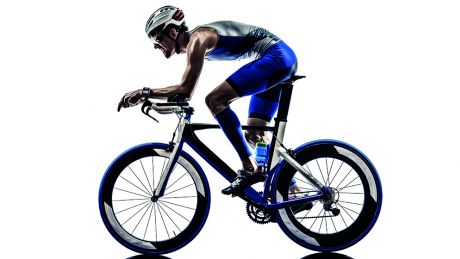9 Ways to Boost Your Triathlon Endurance
Go harder for longer on your bike, in the pool and around the track with these major tips

Sign up for workout ideas, training advice, reviews of the latest gear and more.
You are now subscribed
Your newsletter sign-up was successful
Losing sleep over the triathlon that's fast approaching? Fear not. Coach’s sister magazine, Men’s Fitness, has compiled a list of brilliant pro training tips that will bump up your endurance in all three of the stages, and will give you a fighting chance of crossing that finish line with a smile on your face...
Swimming
Focus your training
“Aim to do two 20- to 30-minute technique sessions during the week where you focus on improving a specific aspect of your stroke like your breathing or kicking,” says Sam Williams, swimming coach at Swim Studio London. “Then do a longer session at the weekend where you add extra lengths or time each week to monitor your progress.”
Stay relaxed
“Endurance sports like cycling and running are all about exertion, but if you’re doing it properly, swimming should be the opposite,” says Williams. “If you’re too tense in the water, you’ll end up thrashing around, wasting energy and tiring yourself out. Instead, focus on staying balanced in the water and maintaining a relaxed stroke.”
RECOMMENDED: Total Immersion Swimming for Triathletes
Know your kit
“Make sure you train wearing and using the kit you plan to race in,” says Williams. “You wouldn’t try to break a new pair of running shoes in the week before a marathon, and swimming is no different – the last thing you want is a new pair of goggles that start letting in water on race day. Having battle-tested gear that you trust and feel comfortable in for hours at a time will stand you in good stead.”
Cycling
Frequency is key
“Aim to ride every other day if you can, making sure you have at least three rest days a week,” says Cyclist magazine’s James Spender. “Even if you only have time for short, 30-minute sessions, a few of these spread across the week will be more productive than just doing one three-hour ride on the weekend. The regularity will help you become more comfortable on the bike and improve your muscle memory for pedalling.”
Nail your nutrition
Using the correct fuel will help you train and recover to the best of your abilities. “Have an easily digestible meal that combines healthy carbs and protein – say, wholegrain rice with chicken breast and green veg – about two hours before your session and a similar meal afterwards,” says Spender. “During the ride, top up your energy levels with a bar, gel or swig of energy drink at 20-minute intervals once you pass the two-hour mark.”
Sign up for workout ideas, training advice, reviews of the latest gear and more.
Learn roadside repairs
It might sound obvious, but being able to change a flat tyre is an absolute must, whatever your level of fitness or experience. “Even if you’ve never had one before, do a practice run during training to familiarise yourself with the process,” says Spender. “You can’t always rely on having other cyclists around to help you if something goes wrong, and the last thing you’d want is for a mid-race puncture to undo all your hard work.”
Running
Make a happiness plan
Even if you stick perfectly to your schedule, it’s not a given that you’ll feel great while you’re training. “It’s normal at times to feel unhappy about how you performed in a training session,” says Kim Ingleby, a British Athletics Coach and personal trainer. “So write down the runs that you’ve really enjoyed and how they made you feel. Then write down what you are unhappy about. Write these on one side of the paper and then, on the other side, write down what you can do to become happier with them. From that list, choose a maximum of three areas to focus on each month to improve and create goals that you can work on.”
Find mid-session strength
During hard training sessions there can be a voice in your head telling you to stop. “This is so common, and it’s our mind’s way of looking after us,” says Ingleby. “When this happens you have two options. First, you can decide you are going to walk or slow down for a minute and get your focus back, breathe deeply and start again. Second, breathe it out: as you inhale, say a positive word like ‘strength’ and exhale out the stopping thought for six breaths, focusing on growing in strength and letting go of fatigue. This sounds too simple to work – but it does.”
Get a winning mindset
Towards the end of any race, whether it’s a 10K or a triathlon, is where the going really gets tough. “When you start to struggle, think of all the people who inspire and motivate you, the people you love in your life and your reasons for taking part in the event,” says Ingleby. “I also find it useful to break the longer running events into 5km or 10km chunks so that as you complete each one, you realise you can do it. Another trick is to have a mini-movie or soundtrack in your mind for near the end, which you can ‘play’ to keep you going until you cross the finish line.”
